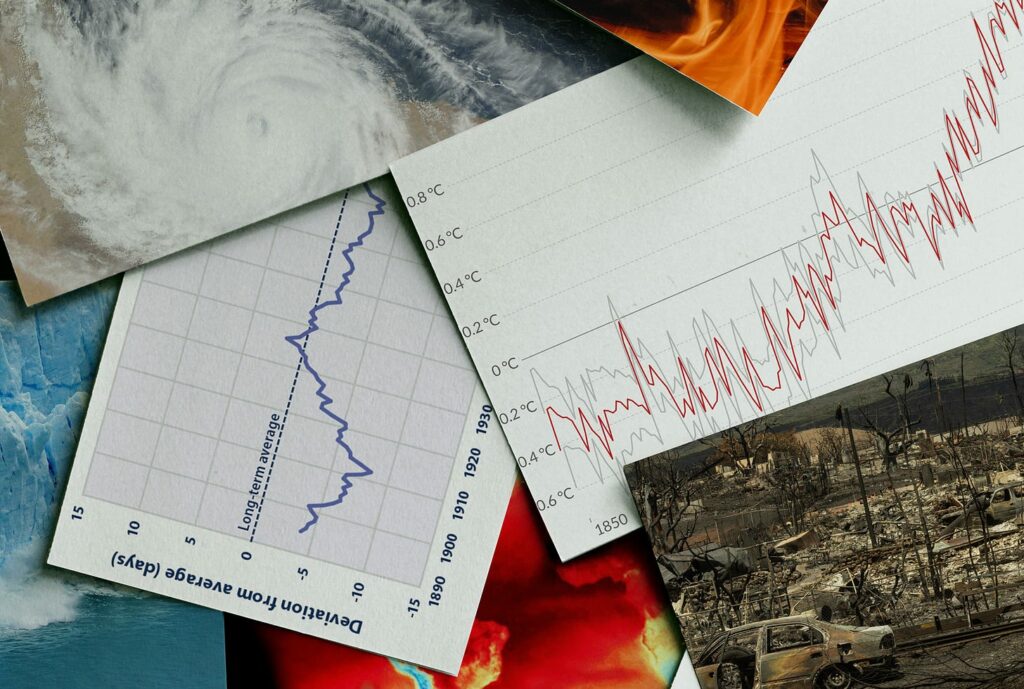Some people still bow down before the idol of “peer review”. But here’s a ghastly story from Nature magazine, which boasts of being “a weekly international journal publishing the finest peer-reviewed research in all fields of science and technology.” Or rather a ghastly story about Nature from Roger Pielke Jr. about a fairy tale masquerading as scientific study that their finest peer-review totally failed to detect, despite it being absurd in content and feeble in methodology. Instead it proved highly influential in academic and policy circles before a critical review blew it to bits. And there’s more where it came from.
It’s all fun and games until someone loses a reputation. Or, if such things never happen in the cozy world of alarmism, a fortune. At the Ecomodernist, whatever that outfit might be, Jessica Weinkle doesn’t mince words:
“Over the past month, the Network for Greening the Financial System (NGFS), has come under serious criticism for implementing modeling methods that are meaningless – and quite so, even in the broader context of increasingly meaningless climate change risk calculations. The situation entails a bad statistical analysis, economic results for the whole world that are highly sensitive to questionable GDP data from Uzbekistan (that’s right, Uzbekistan), and the elite scientific journal Nature which resisted reviewer warnings that something didn’t seem right with the analysis. At stake is monetary policy all over the world. The scandal enveloping NGFS and Nature is telling of the pressure that special interests have put on science for the purpose of advocacy. It is also telling of the willingness of the editorial team at Nature to kowtow to the catastrophism narrative that captured climate change research.”
And monetary policy all over the world matters. Including, we remind you, the nonsense current Canadian Prime Minister Mark Carney tried to foist on everyone through his now-crumbling Glasgow Financial Alliance for Net Zero.
With regard to the Nature scandal, or thing that should be a scandal, as Pielke Jr. explains:
“In 2024, Nature published ‘The Economic Commitment of Climate Change,’ by Kotz et al. (KLW24). A press release accompanying the paper’s publication announced that it projected enormous future GDP losses due to climate change, much more than almost all other studies: ‘Even if CO2 emissions were to be drastically cut down starting today, the world economy is already committed to an income reduction of 19% until 2050 due to climate change, a new study published in “Nature” finds. These damages are six times larger than the mitigation costs needed to limit global warming to two degrees.’ The paper’s extreme results got a lot of attention – According to CarbonBrief, in all of 2024, KLW24 was the second most mentioned climate paper in the media.”
The usual suspects pounced in the usual ways including the Washington Post claiming, incorrectly as RPJ stresses, that the paper explained why food prices were rising. And it gets worse:
“Much more important than the media frenzy, KLW24 quickly found its way into important policy settings, including the U.S. Congressional Budget Office, the OECD, the World Bank, and the UK Office for Budget Responsibility.”
Actually we beg to differ about the relative importance of such things, believing with the late Andrew Breitbart that politics is downstream of culture. But whatever the importance, the humiliating fiasco indicts politicians, bureaucrats, journalists, activists and indeed central bankers who all grabbed at it. So what’s the problem?
Well, the methodology was flawed and grotesquely exaggerated the potential damage. Which is no surprise and might even be described as the modus operandi of the alarmist blob. But here’s the killer detail:
“In a response to KLW24 published last week in Nature, Bearpark et al. (BHH25) showed that correcting inaccurate data from Uzbekistan in KLW24 reduces their estimate of projected 2100 damages due to climate change by about two thirds. This correction makes their damage estimates not statistically different from zero throughout the century. Making matters worse, these projections also employ the implausibly extreme RCP8.5 scenario.”
Imagine making a model claiming authoritatively to predict economic damage from climate change three-quarters of a century from now, piling Ossa on Pelion in modeling terms, that could be thrown completely out of whack by bad data from Uzbekistan.
Before reading further, we defy you to say where it even is on a map. Or what its GDP is.
We did actually know where it was, having been to Azerbaijan for COP29 in late 2024. It’s on the other side of the Caspian Sea, so in the middle of nowhere, especially as it’s landlocked. And it has no GDP. Or rather, one where carrots are a significant sector. After mentioning that it “was ranked 83rd in the Global Innovation Index in 2024”, a sorry comment on those below, Wikipedia says “It is expected that Uzbekistan’s GDP will reach 125 billion dollars in 2025.”
We’re not trying to start a Central Asian feud here so let us note that its nominal GDP is 61st in the world, and per capita it’s 133rd, behind São Tomé and Príncipe, Vanuatu and Honduras while edging out Egypt. But really, any model that can put that much weight on the economy of Uzbekistan is obviously nonsense. And any peer-reviewed process than can let that model by, and the data error, is no better. Especially as the reason nobody noticed the problem is that they were all dogmatically committed to the notion that climate change was bound to trash the economy.



The editors of Nature obviously care no more for the technical reviews of their papers than many deans care for the tenure reviews of their departments: if they can't get the answer they want, they just ignore it. Peer review only works if your peers aren't part of your cabal. I once worked for a failing software company (actually, I worked for several, like many people in Silicon Valley) and as a joke I proposed a product called 'Turbo Tenure'. The idea was to make it easier for users to get tenure by identifying networks of like-minded aspirants with whom you could 'collaborate', by positively reviewing papers for those in your network, as well as citing them and writing letters of recommendation (templates for which would be in the software), while the cabal savaged papers of other assistant professors in your department (letting you be uselessly supportive of those people).
I wish I could sue the climate alarmists for patent infringement, but we didn't proceed with the project, despite the company founder, a former academic, thinking the product would be a big hit; the problems was the market was too small, and consisted of people who refused to pay for things.
The original Nature article received extensive coverage on Radio-Canada’s Téléjournal. I am betting the rebuttal will be completely ignored.
There is no aspect of the climate hoax that is anything but a vehicle to defraud taxpayers!
This is a perfect example of how biased and corrupt "science" has become these days. True science is to accurately find out a question, I was taught the scientific method was to discover the truth no matter what your own desires are. Now it is upside down, the crooks and charlatans are in control, and if a true scientist dares find truth that conflicts with the "consensus" they are called a climate denier and blacklisted by the corrupt majority. I am ashamed of humanity failing so badly that a major scientific journal Nature is corrupt and untrustworthy.